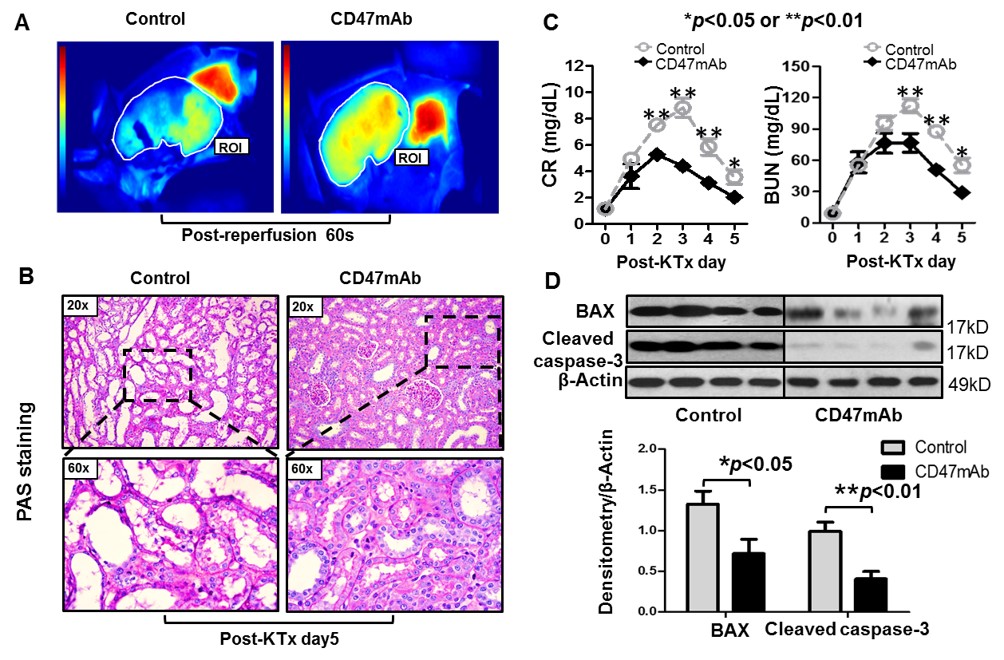A Humanized Anti-CD47 Monoclonal Antibody Therapy Alleviates Ischemia-Reperfusion Injury of Porcine Renal Allografts Donated After Cardiac Death.
1Department of Surgery, Washington University School of Medicine, St. Louis
2Department of Pathology and Immunology, Washington University School of Medicine, St. Louis
3Tioma Therapeutics, Inc, St. Louis
Meeting: 2017 American Transplant Congress
Abstract number: 324
Keywords: Antibodies, Donors, Kidney transplantation, non-heart-beating, Renal injury
Session Information
Session Name: Concurrent Session: Donors with Acute Kidney Injury
Session Type: Concurrent Session
Date: Monday, May 1, 2017
Session Time: 4:30pm-6:00pm
 Presentation Time: 4:30pm-4:42pm
Presentation Time: 4:30pm-4:42pm
Location: E450a
PURPOSE: This study investigated whether the blockade of the CD47 signaling pathway, which is involved in vascular endothelial nitric oxide regulation, reduces ischemia-reperfusion injury (IRI) of renal allografts donated after cardiac death (DCD) in an allogeneic large animal porcine model. METHODS: Renal allografts were subjected to 30 min of warm ischemia time and 3.5 hrs of cold ischemia, and perfused with a humanized anti-CD47 monoclonal antibody (CD47mAb) in the treatment group or HTK solution only in the control group (n=4, respectively). Allograft reperfusion was examined with ICG-based in vivo imaging. Blood and tissue samples were collected, and the animals were euthanized 5 days after transplantation. RESULTS: At the time of reperfusion, in vivo imaging showed that CD47mAb-treated organs had greater and more uniform perfusion. On post-transplant day 3, the treatment group had lower values compared to the control for creatinine (4.4±0.1 vs 8.8±1.7, p<0.001) and blood urea nitrogen (76.7±17.8 vs 112.3±15.9, p<0.01). Histological examination of allograft tissues taken at the end of the experiment showed a significant decrease of the acute tubular injury in the CD47mAb-treated group compared to control (5.7±3.3% vs 43.3±15.2%, p<0.01). Compared to the control group, CD47mAb treatment significantly decreased the mRNA expression of genes related to oxidative injury (sod-1, gpx-1, and txn) and inflammatory response (il-2, il-6, inf-g and tgf-b) in the allografts, as well as MMP2, MMP9, BAX, and caspase-3 (p<0.05, 0.01 or 0.001, respectively). CONCLUSIONS: These data demonstrate that CD47mAb blockade decreases IRI in DCD renal allografts in a large animal model. Its use in human kidney transplants may decrease rates of delayed graft function and improve overall transplant outcomes.
CITATION INFORMATION: Xu M, Banan B, Wang X, Chirumbole D, Rabe B, Garcia-Aroz S, Nayak D, Zhang Z, Jia J, Upadhya G, Gaut J, Manning P, Lin Y, Chapman W. A Humanized Anti-CD47 Monoclonal Antibody Therapy Alleviates Ischemia-Reperfusion Injury of Porcine Renal Allografts Donated After Cardiac Death. Am J Transplant. 2017;17 (suppl 3).
To cite this abstract in AMA style:
Xu M, Banan B, Wang X, Chirumbole D, Rabe B, Garcia-Aroz S, Nayak D, Zhang Z, Jia J, Upadhya G, Gaut J, Manning P, Lin Y, Chapman W. A Humanized Anti-CD47 Monoclonal Antibody Therapy Alleviates Ischemia-Reperfusion Injury of Porcine Renal Allografts Donated After Cardiac Death. [abstract]. Am J Transplant. 2017; 17 (suppl 3). https://atcmeetingabstracts.com/abstract/a-humanized-anti-cd47-monoclonal-antibody-therapy-alleviates-ischemia-reperfusion-injury-of-porcine-renal-allografts-donated-after-cardiac-death/. Accessed February 19, 2026.« Back to 2017 American Transplant Congress
